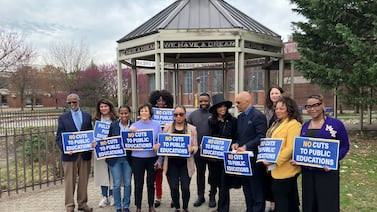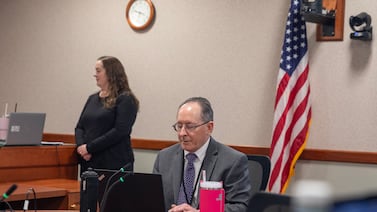Sign up for Chalkbeat Colorado’s free daily newsletter to get the latest reporting from us, plus curated news from other Colorado outlets, delivered to your inbox.
Colorado students would be required to learn about financial literacy under a proposal that state lawmakers advanced Thursday night.
House Bill 1192 would also require educators to place a greater emphasis on teaching students how to fill out state or federal financial aid forms, which open up the possibility of college grants and scholarships. However, the bill would not require high school students to fill out the Free Application for Federal Student Aid in order to graduate.
House Education Committee members have amended the bill heavily, including to strip the FAFSA mandate because of concerns some students, such as those without legal documentation or who have family members not here legally, can’t or won’t want to submit the form.
A bipartisan group of bill sponsors say their proposal helps set up Colorado students with the skills to better understand and manage their finances, as well as plan for the future — whether that’s entering the workforce or going to college. But the bill also faces opposition from teachers unions, school boards, and school executives who said it would place more work on educators without giving them much more funding — the bill requires about $200,000 more in state spending annually.
“Our primary focus is to elevate the needs of our students and communities,” said Assistant Majority Leader Jennifer Bacon, a Denver Democrat who is one of several co-sponsors of the bill. “And I would like us to demonstrate to the state of Colorado that we are willing to try.”
And the bill has received strong support, especially from Denver-area students.
Northfield High School senior Parker Bazaz testified that there’s more financial terminology to navigate than ever before. Students have to learn how to use mobile banking, invest, understand cryptocurrency, and other topics.
High school students should learn from schools how to responsibly spend money and pay for college, Bazaz said.
“Being financially literate empowers young people to make smart decisions,” he said.
Bankers and education groups support the bill
The bill passed in the House Education Committee with an 8 to 5 vote after four hours of testimony and debate. Several dissenters said they were torn in their vote because they see the value, but are reluctant to give teachers more responsibilities when there’s little state funding to support them.
They also argued that a few districts statewide have opted to provide financial literacy without a state mandate. That’s proof educators respond when their community wants this type of instruction, they added.
However, bill sponsor state Rep. Anthony Hartsook, a Parker Republican, said not enough districts have opted into creating financial literacy courses. Every student should learn about financial literacy, which has a set of optional standards revamped in 2021, he said.
“If you learn financial literacy, you then get on the path towards success, and you can control the destiny of your future because you’re in control of your money,” Hartsook said.
Other bill sponsors include State Sens. Jeff Bridges, a Greenwood Village Democrat, and Lisa Frizell, a Castle Rock Republican.
After amendments, the bill would require districts to teach a financial literacy course at some point in a student’s K-12 instruction, starting in September 2026.
Sponsors also amended the bill to remove FAFSA as a graduation requirement. Students would need to learn how to fill out the form, but not necessarily submit it to the federal government because of concerns about the information families have to provide, according to bill sponsors.
Despite pushback from educator groups, the bill does have the backing of some teachers. Other supporters include the Colorado Bankers Association, Colorado Succeeds, Stand for Children, and the Bell Policy Center.
Teacher Elijah Huff added that studies show too few students feel confident about their future finances. The Bruce Randolph School educator said the classes have the ability to help students feel “confident, competent, and competitive with finances.”
“This gives them the competencies to utilize the resources available to manage money and the competitiveness to thrive in a capitalist society,” he said.
Yet such a mandate to teach the course created concerns that lawmakers were encroaching on the autonomy of school districts to determine what’s best for their students and communities.
In a written statement, Summit School District Board of Education member Lisa Webster said school districts are already using state standards to incorporate financial literacy into classes. The one-size-all approach from the state ignores the efforts of communities.
“I understand the positive intent of this bill, however, it overreaches into the responsibilities of our local school boards,” she wrote.
Students benefit from filling out the FAFSA
How to handle students filling out the FAFSA and Colorado Application for State Financial Aid was a sticking point for some groups. Opposition also included the Colorado School Counselors Association, with high school counselor Shayla Reynolds saying the changes would create an undue burden on educators.
The bill sponsors included more education about the FAFSA and CASFA because Colorado ranks near the bottom of the nation in getting students to complete the form. Filling out the form helps them save money on college, sponsors said.
Last year, only 37% of students completed the FAFSA and the state ranked 46th in the nation in getting students to fill out the form.
The idea to increase awareness about the FAFSA and CASFA isn’t new. A group of 20 state experts in 2022 recommended Colorado increase support for students filling out the FAFSA and require it for students to graduate. The recommendations cited the estimated $30 million in financial aid students leave on the table annually by not filling out the form.
States with FAFSA graduation requirements also have much higher rates of completing the form among graduating high school seniors. Despite that, early adopters such as Louisiana have backed off the requirement. The state did provide an opt-out form, but some felt the policy was invasive.
However, research showed the requirement helped increase financial awareness. And students who fill out the form are more likely to head to college, which opens up the possibility of higher-paying jobs.
Jason Gonzales is a reporter covering higher education and the Colorado legislature. Chalkbeat Colorado partners with Open Campus on higher education coverage. Contact Jason at jgonzales@chalkbeat.org.




